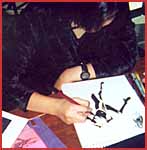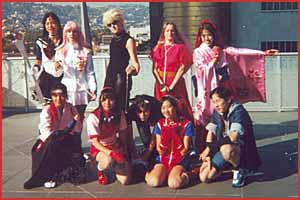by Maxwell Porter
|
THE EVENT -- Four floors above the restored hulks of automotive yesteryear, somewhere off Wilshire Boulevard, in the sprawl of Los Angeles, the few, the proud - the manga/anime/art otaku - arrive on the scene. In the aptly named Peterson Automotive Museum, these artistic souls ventured from their respective lairs to gather together in the communal spirit of art appreciation and self-promotion at a happening little shindig called Comic World 2.
Burgeoning talent and comic maestros alike gravitated toward this nexus on the weekend of October 14-15, uniting the dispersed segments of the manga otaku underworld to spread a simple message: We are here and we are growing. Growing slowly at first, to be sure. But as one attendee noted, "Comic World II kicked the ass of Comic World 1!" Comic World 2 nearly doubled the attendance of its predecessor, held in the same building last August. According to administrator Hiroko Stacey, the registered attendees totaled in the nineties, but an influx of non-paid crashers pushed the headcount to just shy of two hundred. Like Comic World 1, this second convention was again sponsored by the manga art supply company Nihon S.E. Techno. In the main room, a ring of tables attempted, without much success, to divide the viewers from the artists. Eager fans breeched this artificial barrier determined to get an artist eye view as creators happily demonstrated their skills. Several vendors were present as well. Aside from the usual bazaar of anime gewgaws and tapes available for purchase (Banzai and OmachaBox), representatives from Nihon S.E. provided a large selection of essential manga art supplies. Epoxy, the creators of a multimedia comic book, was looping a computer demo on their product. But the human exhibitor never seemed to be there. Despite the intimate setting, cosplaying also represented a significant part of the convention. The small but enthusiastic band of cosplayers roamed the main hall casting a festive ambiance over the entire event. As cosplay contests go this one was as quick and as Sailor-Moon-free as any discriminating otaku could hope for.
But by far the core focus was the artists themselves, who displayed their artwork, drew relentlessly and fielded sticky questions on manga minutia. At the free manga workshops, artists enlightened attentive students on the technicalities of the art. I even tried my own hand at the ancient manga art of applying screen tones, which I quickly realized is trickier than it looks. Even with instructor Henry Liao's careful guidance, it wasn't long before I had a crumpled hill of waded screen tone debris before me. Ah well, manga artists aren't created in a day. Morale was high and the horizon glimmered with the light of promise for these pioneers anxious to foster enduring inroads into America's artistic conscious. DOUJINSHI IN AMERICA -- In the broadest strokes, Comic World organizers envision an artistic conglomeration as diverse as Southern California itself. "Our only hope to get noticed is for us to gather together and publish our own comics, and that won't happen unless we develop a thriving artistic community," said Ran An, artist and instructor overseeing Comic World's free art workshops. "We're not interested only in manga artists, we're hoping to get mainstream American styles as well�we want localization." For the time being, though, the support seems rooted solely in the nibs of anime/manga art aficionados. In fact, the driving force behind the amateur comic art movement in this country has been largely an attempt by U.S. otaku to replicate the flourishing Japanese doujinshi industry. Currently the doujinshi industry's status in the U.S. is naught but a shadow of its trans-pacific counterpart. In Japan, it's not unusual for self-published manga artists to make a name for themselves and put a good hunk of change in the bank doing it. Most Yanks on the other hand don't even give comic books a second glance, much less doujinshi auteur projects. |


